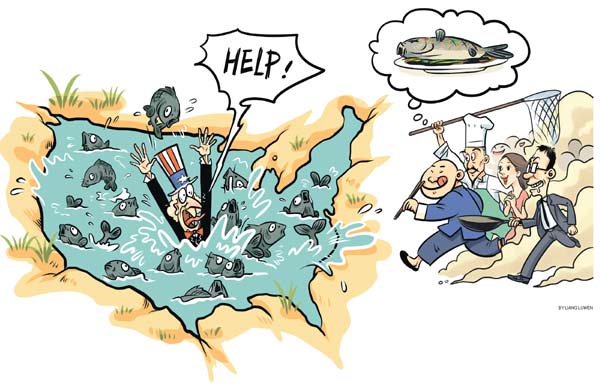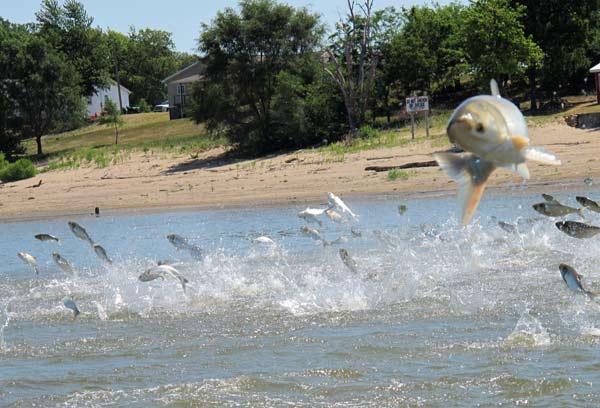Fishing for solutions
Updated: 2014-10-13 07:24
By Wang Qian(China Daily)
|
|||||||||||
 |
Businesses bank on Chinese palates to help rid US of invasive Asian carp, as Wang Qian reports.
For the past three years, John Jia has been getting dozens of calls every day asking about one of the most talked about products heading from the US to China - Asian carp.
Jia is one of the business liaisons for the Illinois-based Big River Fish Corp. The US company started exporting frozen Asian carp and fish products to China in 2005 and is expected to ride on a wave of growth. A processing factory is also being built in the Chinese port city of Tianjin to cater to its expansion.
"This is not only good news for Chinese consumers who will get wild fish to eat; it's also good news for the US because the Chinese are 'eating' the problems that are threatening US rivers," Jia said, smiling.
In the US, Asian carp - an aggressive invasive species - are making their way up the Mississippi River and its tributaries, threatening rivers and lakes. The fish is able to eat nearly 40 percent of its body weight every day and reproduce very quickly. Its spread can be disastrous for major waterways and water bodies like the Mississippi River and Great Lakes.
Asian carp were first introduced into the US from China in the 1970s to help enhance water quality in ponds.
The fish is considered a delicacy in China, and environmentalists have taken efforts to protect the species in the Yangtze River for years due to industrial pollution and the deteriorating water environment.
Getting more Chinese to eat the fish seems to be a win-win solution for the two countries and businessmen like Jia are making full use of the opportunity.
A sales manager of Shanghai-based Santa Food who refused to be named told China Daily in a telephone interview that the fish from the US is totally wild, tasting much better than the Chinese variety, which suffers from a poor water environment and excessive use of medication.
The company imported Asian carp products, including frozen fish and minced fillets, from Big River Fish starting late last year.
"Once clients try our products, they will come again," the manager said.
Even as Chinese businessmen rake in the profits from selling the Asian carp, a group of US scientists arrived in Shanghai, Wuhan and Chongqing in early September to search for solutions to prevent the spread of the fish in their country.
Yang Bo, a freshwater expert from The Nature Conservancy environmental organization, accompanied the group. Yang said one purpose of their visit is also to explore China's market for Asian carp.
They went to a seafood market in Shanghai and an aquatic product processing plant in Wuhan, and even tasted Chinese dishes made of Asian carp, she said.
"Chinese love eating the fish, and the US has too many of them. It makes sense to explore a business plan to help both sides get what they want," Yang said.
Entrepreneurs in China and US are increasingly aware of the economic opportunity. Big River Fish signed a contract in 2010 to export 13.6 million kilograms of Asian carp to the Beijing Zhuochen Livestock Husbandry company every year, according to the Ministry of Foreign Affairs website.
The business has a lot more room for expansion, Jia said.
Business obstacles
Still, Yang said there are many barriers to making the business sustainable and large scale.
These include the high cost of transportation, tariffs and the Asian Carp Prevention and Control Act, a US law that makes transporting live fish across US state boundaries illegal.
Jim Garvey, director of the Fisheries and Aquaculture Center at Southern Illinois University Carbondale, who was part of the visit, said he hopes that research and collaboration between the US and China will lead to greater demand for the fish and enhanced economic opportunity.
Garvey admitted that exporting the products to China and other countries has proved to be difficult because of the economics of shipping and lack of clear demand abroad.
For Sun Shihu, sales manager of the Qingdao Oceanfriends IMP and EXP in Shandong province, these barriers are actually making its Asian carp business unprofitable.
Sun's company started selling the frozen fish imported from the US in 2013 at a price of about 9,500 yuan ($1,560) a metric ton to 11,000 yuan a ton.
Today's Top News
High-speed rail part of deals worth $10b
'Minimum force' to remove protest road barriers in Hong Kong
Dreams and realities about China's special education
Spain's Catalonia to call off independence referendum
Alibaba set to expand 'double 11'
Premier Li in Russia to boost trade ties
China's exports jump 15.3%
IMF risks irrelevance without change, experts say
Hot Topics
Lunar probe , China growth forecasts, Emission rules get tougher, China seen through 'colored lens', International board,
Editor's Picks

|

|

|

|

|

|






